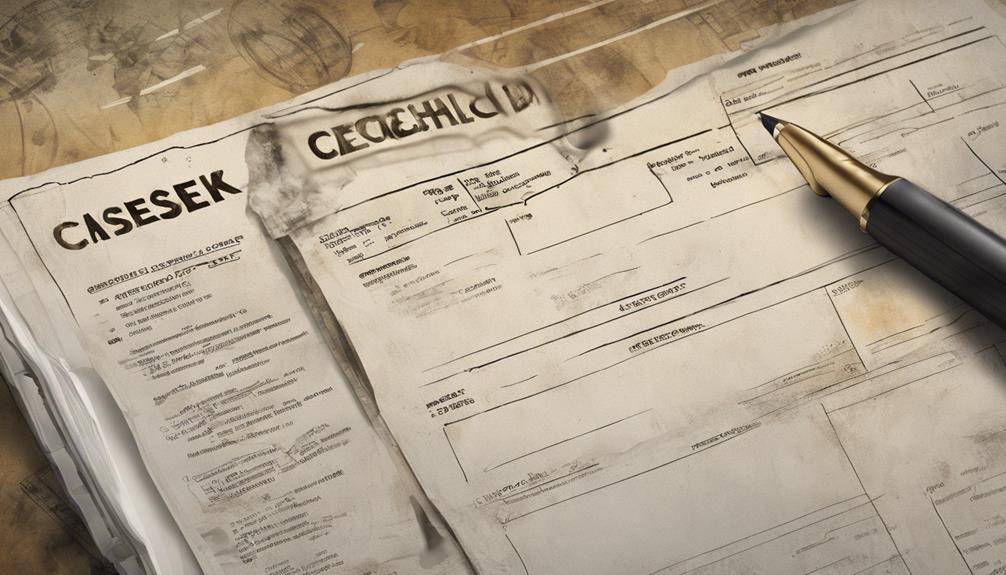Sealed records can be effective in background checks, limiting public access to certain information. However, their impact varies based on factors such as court orders and the type of record. Understanding the differences between expungement and sealing is essential for managing background checks effectively. Deferred adjudication and the process of sealing DWI convictions play significant roles in determining the visibility of charges. Legal assistance can greatly aid individuals in managing the sealing process successfully. Sealing records may enhance employment and housing prospects by providing fair opportunities. More insights into the nuances of sealed records can offer valuable knowledge.
Key Takeaways
- Sealed records limit access on most background checks.
- Private companies may not retrieve sealed record information.
- Law enforcement and government agencies can access sealed records.
- Sealing records can enhance job prospects by concealing past offenses.
- Understanding the impact of sealed records on various checks is crucial.
Understanding Record Sealing Eligibility

To determine eligibility for record sealing in Texas, individuals must meet specific criteria outlined by state law. One key requirement is completing the terms of deferred adjudication successfully. This means fulfilling the conditions set by the court without any violations.
Additionally, individuals seeking record sealing mustn't have any new convictions or deferred adjudications on their criminal records. It's essential to have a clean post-conviction history to qualify for record sealing in Texas.
Once a record is sealed, it isn't accessible to the general public. However, certain entities within the criminal justice system can still view these sealed records for specific purposes. Before granting a request for record sealing, judges carefully assess whether it serves the interest of justice.
Ultimately, record sealing offers individuals a chance to improve their prospects for employment and housing by presenting a clean slate free from past criminal involvement.
Key Differences Between Sealing and Expungement
Sealing and expungement present vital distinctions in the handling of criminal records.
While sealing limits public access, expungement erases the record entirely.
Understanding these differences is important for individuals dealing with the complexities of their criminal history and its implications on background checks.
Sealing Vs Expungement Contrasts
When comparing the processes of sealing and expungement, a significant distinction lies in the degree of permanence each offers for clearing a criminal record.
Sealed records are generally hidden from public view but can still be accessed through a court order, whereas expunged records are entirely eliminated from public record access.
Expungement effectively erases the record of an arrest or conviction, providing a more thorough solution compared to sealing, which simply restricts access to the information.
It's important to note that expungement typically involves meeting specific eligibility criteria and adhering to waiting periods, unlike sealing, which may be a more straightforward process.
Understanding these differences is essential for individuals seeking to clear their criminal records effectively and navigate the legal procedures involved in either sealing or expungement.
Record Accessibility Variance
A significant difference between sealing and expungement lies in the availability of criminal records after the legal processes are completed. When records are sealed, they're hidden from public view but can still be accessed within the criminal justice system through court order.
On the other hand, expungement completely erases an arrest or conviction from the record, making it inaccessible even through court orders. This variation in accessibility is a vital factor for individuals looking to enhance their background checks and opportunities.
Understanding the differences between sealed and expunged records is essential for those navigating the legal system. Consulting a knowledgeable criminal defense attorney can help individuals determine the best course of action based on their specific circumstances.
Impact of Deferred Adjudication on Background Checks

Deferred adjudication can have lasting implications on background checks, as it may still be visible to potential employers and landlords.
Even though it isn't considered a conviction, the original charge could impact job opportunities and housing options.
Sealing the record post-deferred adjudication can be a beneficial step to prevent the original charge from showing up on background checks.
Deferred Adjudication Dismissal
The impact of a deferred adjudication dismissal on background checks can vary greatly depending on the depth of the screening process. While deferred adjudication may offer individuals a second chance by avoiding a formal conviction, the record of the charge can still be accessible within the criminal justice system.
Employers and landlords conducting thorough background checks may uncover the existence of a deferred adjudication, which could potentially influence their decisions regarding job or housing prospects. Despite the potential benefits of deferred adjudication, it may not completely shield individuals from the consequences during background screenings.
One way to limit the visibility of a deferred adjudication on background checks is by sealing the record through an Order of Nondisclosure. This legal process can help enhance an individual's prospects for employment and housing by restricting access to certain criminal records, providing a level of protection against the negative impacts of a deferred adjudication dismissal.
Background Check Implications
Understanding the impact of deferred adjudication on background checks is significant for individuals facing employment and housing opportunities post-conviction. Even though a charge may have been dismissed through deferred adjudication, it can still appear on background checks, potentially influencing decisions made by employers or landlords. Some background check companies have access to sealed records, which means that even if a record has been sealed, it could still be included in their reports. It's important for individuals with sealed records to comprehend how this could affect their future prospects.
| Background Check Implications | ||
|---|---|---|
| Impact of Deferred Adjudication | Consideration by Employers and Landlords | Awareness of Sealed Records |
| Deferred adjudication can show up on background checks. | Employers and landlords may take into account dismissed but not expunged charges. | Understanding the potential inclusion of sealed records in background checks is crucial. |
Record Sealing Benefits
Sealing a record after completing deferred adjudication can greatly enhance the outcomes of background checks by concealing the offense from public scrutiny. This process offers individuals several benefits that can significantly impact their future prospects:
- Improved Employment Opportunities: Record sealing can increase the likelihood of securing employment as potential employers conducting background checks may not have access to sealed criminal history, giving individuals a fair chance based on their qualifications.
- Enhanced Housing Options: Landlords often run background checks on prospective tenants. Sealing records can lead to more housing opportunities as sealed offenses wouldn't be visible during these checks.
- Fresh Start and Reintegration: By sealing their criminal history, individuals can move forward without the burden of past offenses affecting their chances at various opportunities, allowing for a fresh start and better reintegration into society.
Exploring the Consequences of Criminal Charges
Exploring how criminal charges can impact various aspects of an individual's life reveals substantial challenges in employment, education, housing, and professional advancement.
A criminal record can significantly impede job opportunities, as many employers conduct background checks and may be hesitant to hire individuals with past charges. Additionally, the stigma associated with a criminal record can lead to a decrease in social standing, affecting personal relationships and community perception.
In terms of education, pursuing higher studies may become challenging with a criminal record, limiting access to certain programs and opportunities. Securing housing, whether through renting or obtaining a home loan, can also pose difficulties as landlords and lenders often consider criminal records when approving applications.
Furthermore, professional licensure requirements may be impacted by a criminal record, potentially jeopardizing career paths and job opportunities. Individuals with criminal charges may face barriers in obtaining licenses necessary for certain professions, thereby limiting their professional growth and advancement.
Process of Sealing DWI Convictions in Texas

The impact of criminal charges extends to DWI convictions in Texas, where the process of sealing these convictions plays a significant role in mitigating potential consequences for individuals.
In Texas, qualifying DWI convictions can be sealed through an Order of Nondisclosure. This action prevents the charge from appearing on most background checks, offering individuals a chance to move forward without the stigma of a DWI conviction.
However, certain disqualifying factors, such as multiple DWI convictions, may hinder the sealing of a DWI charge. It's crucial to note that felony DWIs in Texas can't be sealed and will remain on a person's record indefinitely.
Seeking legal assistance is vital in successfully navigating the complexities of the sealing process for DWI convictions in Texas, ensuring that individuals follow the correct procedures and meet all necessary requirements for a favorable outcome.
Importance of Legal Assistance in Sealing Records
Professional legal guidance proves invaluable in successfully managing the process of sealing records, guaranteeing individuals meet all requirements for a favorable outcome. When seeking to seal records, enlisting the help of a criminal defense lawyer can greatly impact the process. These attorneys possess the expertise required to navigate the intricate legal requirements involved in record sealing.
They can assist in properly filing and presenting the case, increasing the likelihood of a successful outcome. Furthermore, legal professionals can identify any disqualifying factors that may hinder the sealing process and effectively address them. By working with a lawyer, individuals can expedite the sealing process, minimize potential errors, and make sure that all necessary steps are taken for a successful record sealing.
Hence, legal assistance plays a pivotal role in maximizing the chances of achieving a positive result when seeking to seal records.
Enhancing Employment and Housing Prospects

Individuals with sealed records can experience significant enhancements in their employment and housing prospects due to the limitations placed on certain criminal offenses appearing on background checks. Sealing records opens up new opportunities for these individuals, allowing them to pursue their career and housing goals without the stigma of past mistakes hindering their progress.
Some key points to bear in mind include:
- Sealed records can improve job opportunities by increasing the chances of passing background checks conducted by potential employers.
- Housing prospects may also be improved as landlords conducting background checks won't have visibility into certain sealed offenses.
- Employers and landlords often don't take sealed offenses into account in their decision-making processes, providing a fair chance for individuals with sealed records to secure employment and housing.
Navigating Sealed Records in Background Checks
Exploring sealed records in background checks requires a clear understanding of who can access these records and how they may still impact various aspects of an individual's life.
While private background check companies may not have access to sealed records, entities like law enforcement and government agencies can often retrieve this information.
Sealing a record can indeed enhance job prospects, as many employers are prohibited from considering sealed offenses during the hiring process. However, individuals with sealed records should be aware that certain situations, like applying for professional licenses or security clearances, may necessitate the disclosure of their criminal history.
Understanding the implications of sealed records is vital for both securing employment opportunities and complying with legal requirements. By staying informed about the accessibility and potential consequences of sealed records, individuals can make more informed decisions regarding their background checks and related disclosures.
Frequently Asked Questions
Will a Sealed Record Show up on a Background Check in Texas?
A sealed record in Texas may not appear on a standard background check. While inaccessible to private companies and landlords, law enforcement and certain government entities may still have access through a court order.
Will a Sealed Record Show up on a Background Check Florida?
In Florida, sealed records may not appear on standard background checks for most employers. However, certain entities like law enforcement and government organizations could still access sealed records. Private background check companies might not report sealed records.
Will Your Records Show on Background Check if You Have Them Sealed in California?
In California, sealed records generally do not show up on background checks conducted by private entities. However, certain government agencies may still have access to sealed records for specific purposes, impacting their effectiveness in remaining hidden.
Can Finra See Sealed Records?
FINRA can view sealed records during background checks. Sealed records, though sealed from general view, may still influence FINRA's assessment of an individual's suitability for employment in the financial industry. It's important to disclose sealed records to avoid potential consequences.
Conclusion
To sum up, sealed records background checks are the ultimate game-changer for individuals looking to turn their lives around. With the power to erase past mistakes and open doors to new opportunities, sealing records can completely transform one's future.
The impact of sealing records on employment and housing prospects is nothing short of miraculous, offering a fresh start and a chance at a brighter tomorrow.
Don't underestimate the power of sealed records – they truly are life-changing.









